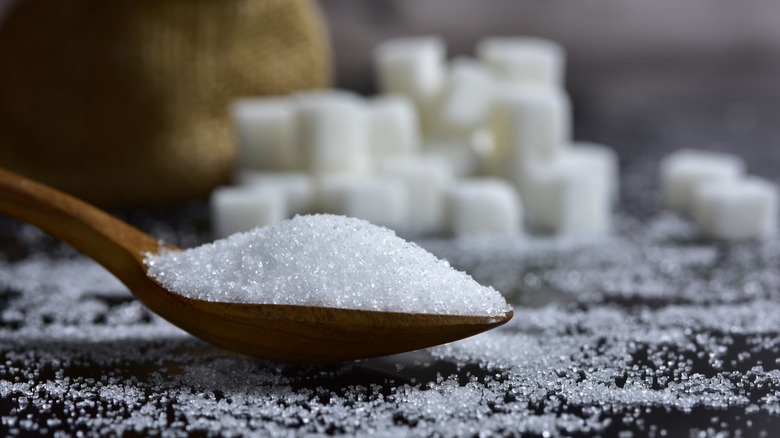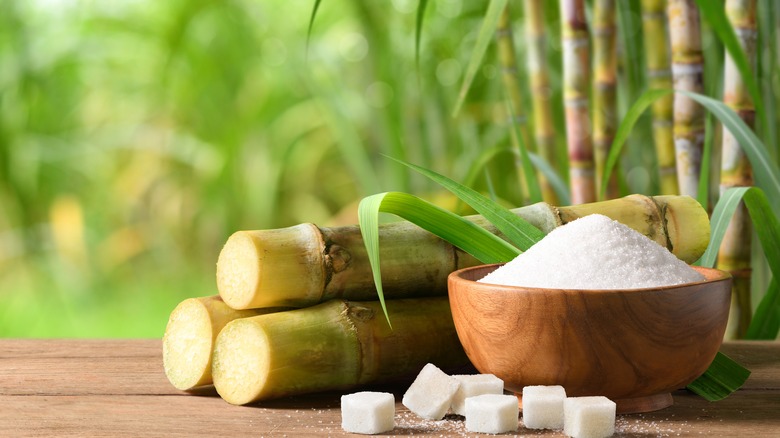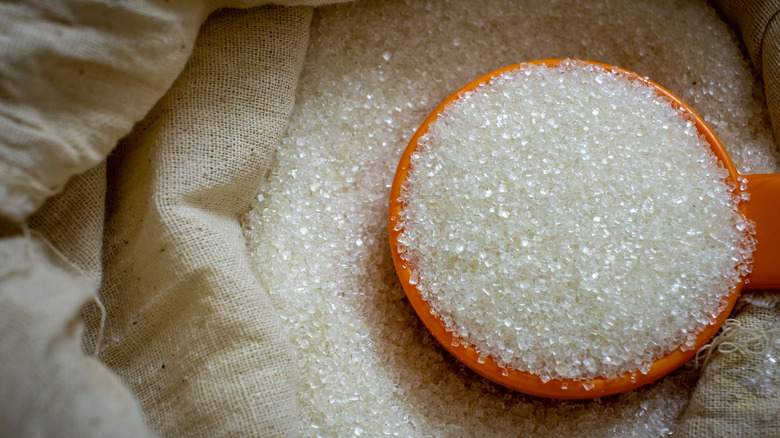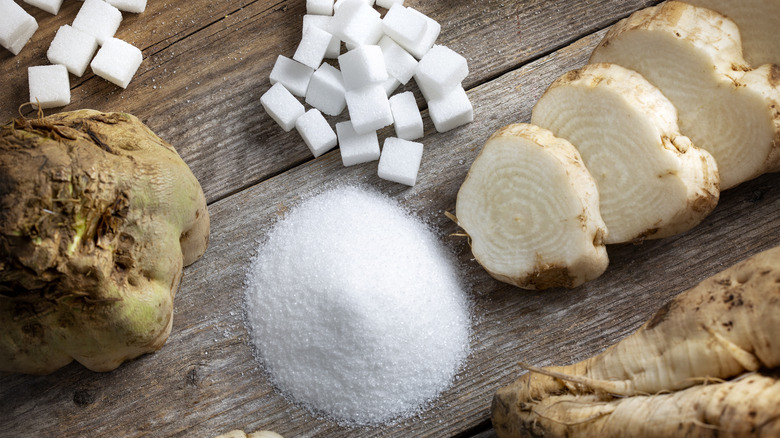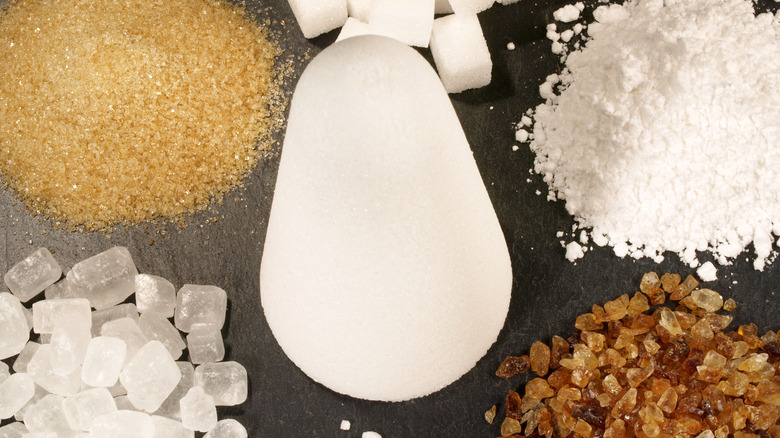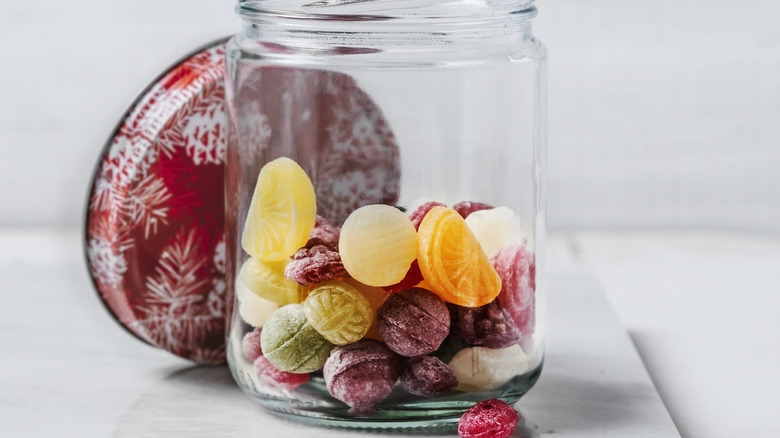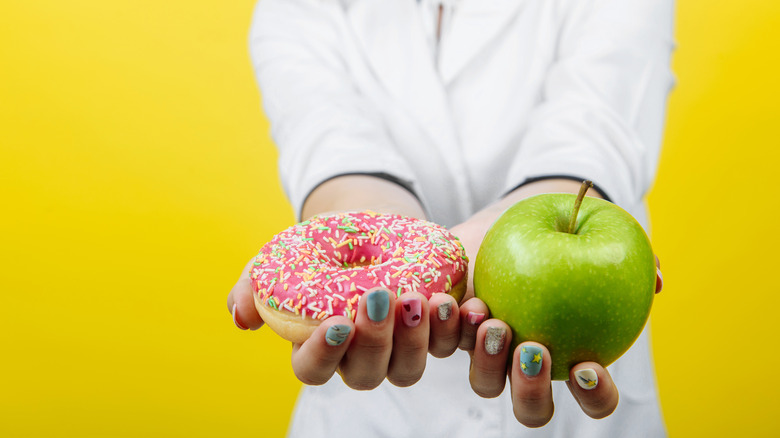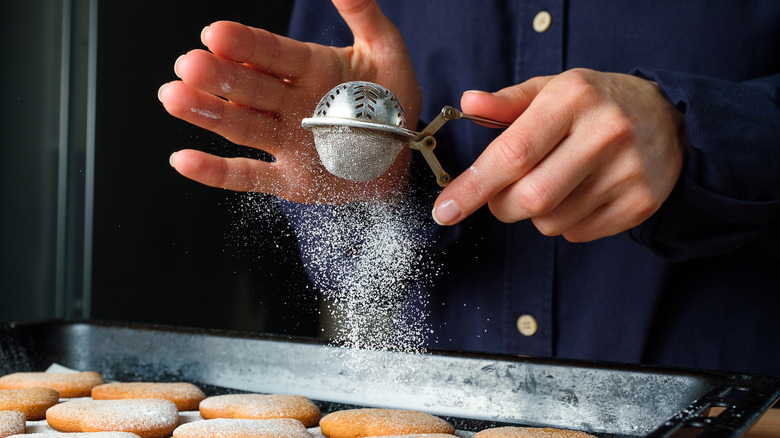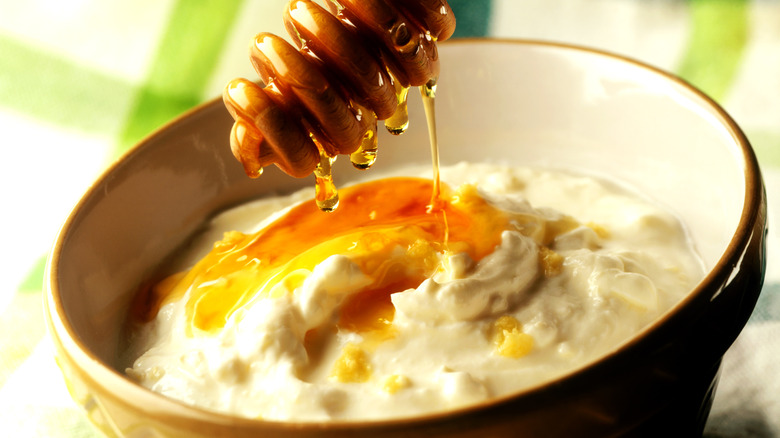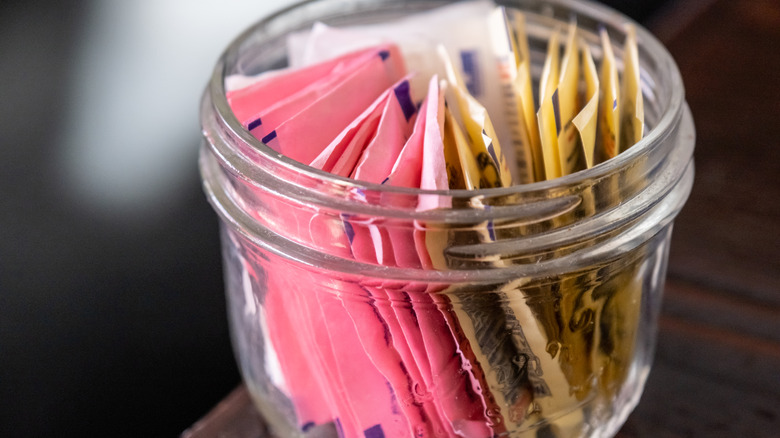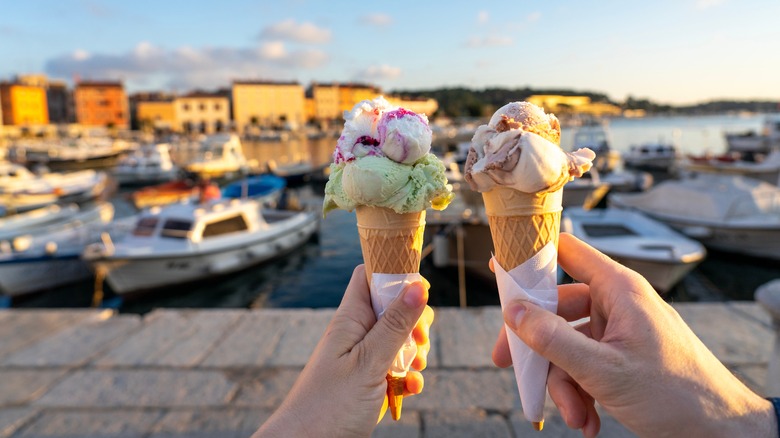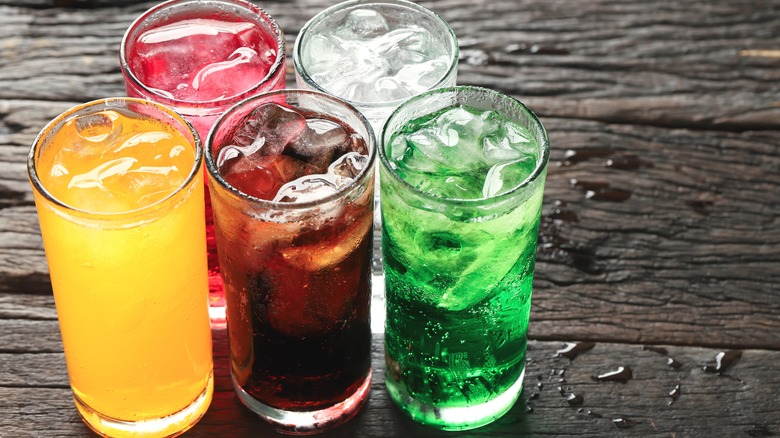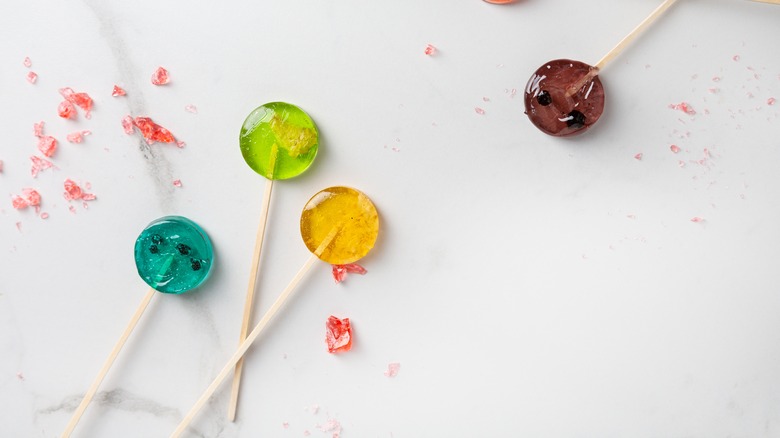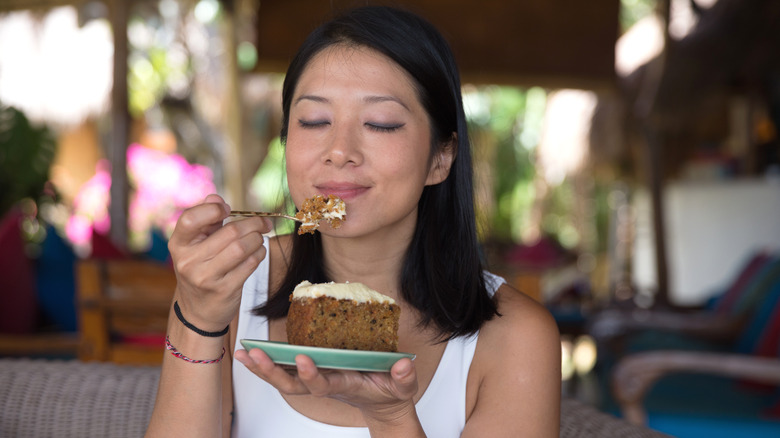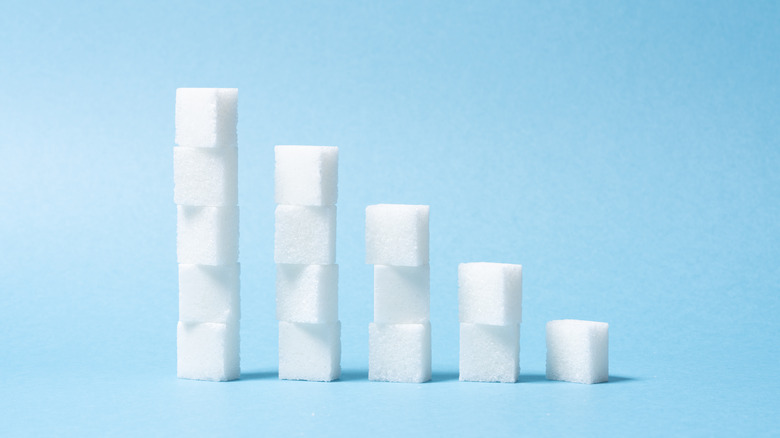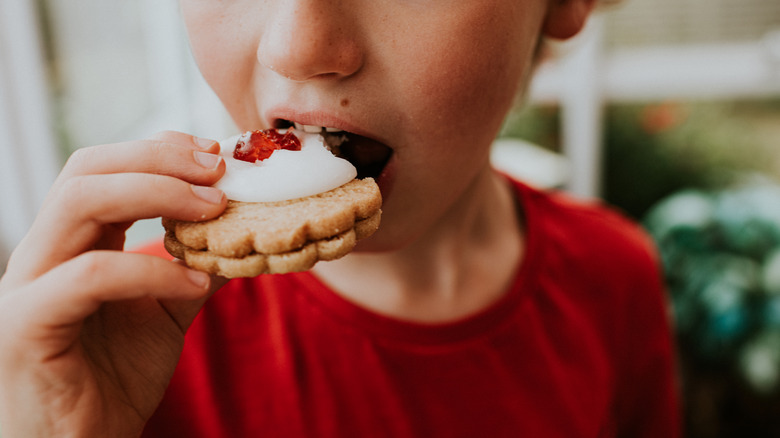Everything You Wanted To Know About Sugar But Were Too Afraid To Ask
People consume sugar around the world, whether in its naturally occurring form in foods like fruits and vegetables or as an additive in soft drinks, sweets, and sauces. Added sugars are considered unhealthy by some and a downright threat to human health by others. However, they're still a big part of most of our diets, and some sugar is even necessary as a component of our overall well-being.
Despite how frequently you consume it, there may be some things you don't know about sugar. We've gotten to the bottom of some common questions about sugar with the help of Dr. Jennifer Silver, dentist and owner of the Macleod Trail Dental Clinic; and Joanne Gallagher, baker, writer, and co-owner of the recipe blog, Inspired Taste. Here's everything you wanted to know about sugar — and in some cases, might have been afraid to ask.
What is sugar, really?
Sugar is essentially a source of energy. There are two kinds of sugar: sugar that's found naturally in certain foods, and refined sugar. Refined sugar is most commonly extracted from sugar cane or sugar beets and then added to food and drinks to make them sweet. You can find naturally occurring sugar in fruits, vegetables, dairy products, and wheat. Refined sugar, on the other hand, typically comes in powder form and is added to food or drinks, either on a large-scale industrial level or by individuals including it in recipes at home. Of all the refined sugar on the market today, 80% comes from sugar cane, while 20% comes from sugar beets.
Obtaining refined sugar involves extracting the juice from sugar cane or sugar beets, and then crystallizing the syrupy result. After processing to remove any remaining liquid, the sugar that remains is in the crystal form we all recognize.
The first sugar cane crops were grown in New Guinea in 8,000 BCE. This sugar wasn't refined, but eaten directly from the cane. By 2,500 BCE, sugar was being refined in India. Today, India continues to be one of the world's biggest sugar-growing countries, along with Brazil, Thailand, China, and the U.S. European countries, including France, Germany, and the Netherlands, also contribute to sugar production — 50% of the world's sugar beets are grown there.
Is sugar naturally white?
With some exceptions (like brown sugar, for instance), most refined sugar is white. As it turns out, however, this sugar doesn't always start out that color. Sugar extracted from sugar beets is white from the start, but sugar that comes from sugar cane is actually more of a brownish or yellowish color. In fact, if you've ever sprinkled a packet of Sugar in the Raw into your coffee or tea, the color you see is of cane sugar that's only been crystalized once. As the brand's name suggests, this kind of sugar is known as "raw sugar."
Refined cane sugar, on the other hand, has undergone several rounds of refining and purification to give it its bright white color. So, why do we make cane sugar white? It seems to come down to both the refining process, as well as aesthetic preferences.
Is sugar vegan?
Sugar comes from plants, so it seems like it would be vegan. If you don't eat animal products, though, here's one thing about sugar that isn't so sweet: many brands of refined sugar fall into the dubious category of foods you'd think are vegan, but aren't. This is because part of the process of refining sugar from sugar cane is making its naturally brownish or yellowish color a bright white. This involves using bone char or fragments of cow bones.
The best way to be sure you're actually using vegan sugar is to choose sugar that comes from beets. Because beet sugar is naturally white, it doesn't undergo the whitening process. If you can't get beet sugar, choose a brand that has the Certified Vegan logo on its packaging, or contact the company directly to see if they use bone char in their refining process.
How many kinds of sugar are there?
There are two main types of sugar — naturally occurring sugars and added sugars — but in reality, it's a lot more complicated than that. There are several forms of naturally occurring sugar, including glucose, sucrose, fructose, and lactose, and combinations of these. As for added sugars, you'll find them in many forms and under many names. Some tend to be used in packaged foods or on a large scale. For instance, check out the labels of some foods you buy and you'll likely find terms like fruit juice concentrate, corn syrup, and dextrose. On the other hand, if you're a cook or baker, you may be familiar with varieties like granulated sugar, brown sugar, caster sugar, and isomalt.
There are more than 60 terms for added sugars, so it may not be easy to remember them all. Johns Hopkins Medicine does give a few tips that can help you spot less obvious sugar sources, though. For instance, ingredients with the letters "-ose" at the end or anything called syrup are most likely a form of sugar.
What are the health risks of consuming sugar?
There may be no better example of the saying, "Everything has a price," than sugar. Its sweet taste heightens so many treats, but consuming too much added sugar is linked to a number of serious health issues. These include liver disease, cardiovascular disease, type 2 diabetes, and obesity.
Excessive sugar consumption also wreaks havoc on the teeth and gums. Dentist Dr. Jennifer Silver explained that sugar is "a primary food source for the harmful bacteria that reside in our mouths." She goes on to describe the consequence of feeding those bacteria: "When these bacteria metabolize sugar, they produce acids as a byproduct. These acids are corrosive and begin to erode tooth enamel, the protective outer layer of the teeth. Over time, this enamel erosion leads to the formation of cavities and tooth decay [and] can lead to more serious dental issues, including severe cavities, gum infections, and even tooth loss."
Are there any health benefits of sugar?
Consuming sugar comes with a bevy of health risks, but there are a few health benefits, too. According to Harvard Medical School, the cells in our bodies need the energy that sugar provides. Ideally, most of this energy will come from sugars that occur naturally in healthy foods. But even added sugar can, at times, be helpful. "Moderate amounts of sugar can indeed provide a valuable quick energy boost," says Dr. Jennifer Silver. "This can be particularly beneficial for athletes or anyone needing a rapid energy pick-me-up."
Dr. Silver's words also apply to certain people who have type 1 diabetes, who may have to eat something sugary to quickly raise their blood sugar level. Not being able to regulate blood sugar can lead to dangerous symptoms or even death. In this case, sugar can literally save lives. As a general rule, though, added sugar's health risks outweigh its benefits, so try not to consume too much of it, no matter how tempting it might be.
What is the healthiest kind of sugar?
Interestingly, our body reacts to and processes sugar the same way, whether it's naturally occurring or added sugar. The main reason added sugars are considered unhealthy is that while naturally occurring sugars are usually present in a low amount, the same can't always be said for added sugars. For instance, a 12-ounce can of Coke contains 39 grams of sugar. On the other hand, there are only 12 grams of naturally occurring sugar in a 12-ounce glass of milk.
There's also the fact that natural sugars are found in foods that are usually healthier or have some added nutritional benefit than foods with added sugars. These include fruits, but also things that don't necessarily taste sweet, like vegetables, milk, and wheat. So, while there may not be a sugar you could say is the healthiest, the healthiest way to consume sugar is in food that is sweetened naturally and filled with nutrients.
How to use sugar in cooking and baking
Sugar is a key element in lots of baking recipes. But, in addition to contributing to the sweet deliciousness of many baked goods, sugar can also play other roles in cooking and baking. For instance, different kinds of sugar can impact the texture of certain recipes. "Brown sugar is a must for my favorite chocolate chip cookies, making them rich and chewy," says baker Joanne Gallagher.
Like many cooks, she also uses sugar with savory dishes, though not necessarily to make them sweet. "[Sugar] does a great job of balancing flavors and making things taste more interesting," she says. Gallagher adds that sugar can also help tone down certain aspects of a dish: "A bit of sugar can mellow the heat in spicy dishes and seasonings ... And if my tomato sauce tastes too acidic, a pinch of sugar works like a charm to round out the flavors."
What's the best way to store sugar?
One of the best things about sugar (in addition to its taste) is that processed sugar doesn't expire quickly! It has a long shelf life and if it's stored in a cool, dry place, refined sugar could theoretically be edible for eons. But it probably won't be at its freshest or keep its texture after about two years. This could be an issue if you're using it to bake with, since a recipe may not be executed as well if your sugar is clumpy.
To keep your sugar in the best condition for the longest possible amount of time, storage is key. "I store my sugar in airtight containers, like glass jars or resealable plastic containers," Joanne Gallagher says. "For brown sugar, which tends to clump more easily, I add a terracotta disk to the container to help absorb any excess moisture." If you don't have a terracotta disk, you can soften brown sugar by putting a piece of still-moist stale bread in the container overnight.
What can replace sugar in a recipe?
If you want or have to limit your added sugar consumption, there are ways to replace sugar in most recipes or drinks. One solution is using an artificial sweetener instead. Artificial sweeteners are chemical or sometimes herbal substances that can be as sweet as — or even sweeter than — sugar. Some common artificial sweeteners made from chemicals include aspartame, saccharine, and sucralose. You may also be familiar with sweeteners derived from plants, like stevia.
There are other natural ways to replace sugar, as well. Try using ingredients like honey, unsweetened applesauce, or even mashed bananas. Joanne Gallagher has another favorite natural sugar substitute. "[I] love my local honey and maple syrup for cooking," she says. "I drizzle honey over roasted vegetables, like carrots, and use it a lot to make homemade salad dressings. Maple syrup is my go-to for pancakes, waffles, and oatmeal."
Are artificial sweeteners healthier than sugar?
Unlike sugar, artificial sweeteners have few or even no calories at all, and because they're sugar-free, they don't directly contribute to health issues like cavities and tooth decay. Artificial sweeteners also allow people who can't consume sugar or who have to limit their sugar intake to still enjoy a sweet snack or drink.
But for all their good qualities, there can be a downside to artificial sweeteners. The World Health Organization currently advises against using artificial sweeteners for weight management. According to their research, artificial sweeteners may not be effective in helping people lose or manage their weight and instead can cause increased risks of health issues like cardiovascular disease and type 2 diabetes. Ultimately, if you don't have any medical reason to avoid them, it's probably best to use natural sugar substitutes, like honey or unsweetened applesauce, instead of artificial sweeteners.
How much sugar should you eat in a day?
Like many health-related matters, a person's daily recommended sugar allowance can vary depending on what source of information you consult. The most recent daily recommended sugar allowance for Americans comes from the CDC's Dietary Guidelines for Americans 2020–2025, which advises that, starting at two years old, a person's daily consumption of added (not naturally occurring) sugar should be no more than 10% of their total calorie intake.
The CDC's website uses an average healthy adult calorie intake of 2,000 calories a day as an example. In this case, added sugars should account for 200 calories, or 12 teaspoons or less. Of course, these are just one set of guidelines, and they also pertain to the average, healthy person. Someone with diabetes, for instance, would follow different guidelines and consume sugar based on their blood glucose level.
Which foods and drinks have the most added sugar?
You'll find added sugar in lots of foods, but the number one source of added sugar for most Americans is beverages, namely sodas, energy drinks, and iced teas. Even fruit juice contains high amounts of added sugar, making this "healthy" choice not as healthy as you'd think.
When it comes to foods with added sugars, candy and ice cream unsurprisingly make the American Heart Association's list of the top added sugar sources. But the list also includes other snacks that are secretly loaded with added sugar, like breakfast bars and flavored yogurt. It turns out that even cereals without marshmallows or sugary frosting are usually still full of added sugars. Dressings and other sauces are another significant source of added sugars for many of us. And other major culprits to watch out for include ketchup, barbecue sauce, sriracha, and most store-bought salad dressings.
Do you need to eat sugar to live?
A reasonable amount of sugar is necessary for the human body to survive and function, according to Johns Hopkins Medicine. The food we eat contains carbohydrates which our bodies turn into glucose, aka sugar. This glucose enters our bloodstream and is used to fuel and energize us.
In this case, the sugars we need are naturally occurring sugars in healthy foods. But in certain cases, consuming added sugar can be necessary. This is typically true for people suffering from hypoglycemia (low blood sugar), including people who have type 1 diabetes. That said, as a general rule, you should limit your consumption of added sugars if you don't need them for energy or blood sugar control.
Can you be addicted to sugar?
In addition to giving us energy, sugar also triggers positive feelings in the brain, releasing hormones like dopamine that can contribute to cravings. Humans have evolved to crave sugar because our prehistoric ancestors needed it for energy. But today, we don't need excessive amounts of it. Still, some of us struggle to let go of the comforting, rewarding feeling we get when we eat something sweet, and it doesn't help that the more sugar you consume, the more you want.
But while sugar sets off chemical reactions in the body and brain, there's debate about whether or not someone can be addicted to it the same way they could be addicted to drugs or alcohol. Regardless, most medical experts acknowledge that whether it's an addiction or just an addictive habit, some of us desperately crave the sweet pick-me-up of sugar.
If this sounds like you, and you're worried, Dr. Jennifer Silver has advice. "It's helpful to approach the issue gradually," she says. "Start by reducing sugar intake incrementally rather than eliminating it entirely, which can be overwhelming. Focus on substituting sugary snacks with healthier options like fruits or nuts. Educating yourself about hidden sugars in processed foods and reading labels can also aid in reducing intake."
Should you completely eliminate sugar from your diet?
Since sugar occurs naturally in several healthy foods that many of us eat often, it's nearly impossible to completely eliminate sugar from your diet. Even if you did manage it, you'd also be removing lots of important vitamins and nutrients.
But you can cut out added sugars from your diet. Unlike naturally occurring sugars, added sugars aren't essential to our survival. Then again, if a life without added sugar doesn't seem like much of a life, not to worry. It's entirely possible for most people to enjoy added sugars and stay healthy.
"Moderation is key," Dr. Jennifer Silver says. "Allow yourself to enjoy occasional treats without guilt." Joanne Gallagher cosigns this advice as someone whose job regularly puts her in the path of sweet treats. "A healthy relationship with sweets is about balance, not restriction," Gallagher says. "Enjoy a variety of foods, and feel free to include the treats you genuinely love. For me, the moment I'm no longer mindful of what I'm eating, I do my best to re-center and find my balance again."
Will humans ever stop eating sugar?
Most of us know that added sugars aren't healthy and can contribute to a myriad of health conditions and excess weight gain. And yet, most of us still willingly consume added sugars. We either don't want to stop or simply can't.
Some biologists and anthropologists study how and why humans respond to different tastes. Dr. Stephen Wooding, Assistant Professor of Anthropology and Heritage Studies at the University of California, Merced, said in an essay in The Conversation that even babies respond positively to sweetness because humans have been hardwired to like it for millennia. Plants that contained the most energy often taste sweet, and since it was vital for our hunter-gatherer ancestors to get as much energy as they could, we adapted to like and seek out sweet foods over others.
Life is very different today, but Wooding doesn't believe humans will ever stop consuming added sugars. "You are responding precisely as programmed by natural selection," he said. His findings are backed up by statistics published by CZapp that show sugar consumption worldwide is strong and is expected to continue to be in the coming years.
